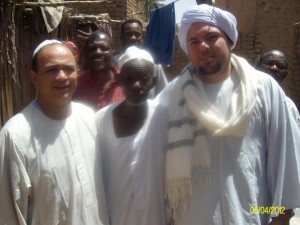 Robson (pronounced Hobson in the manner of Brazilian Portuguese) Gomes is a long time and valued friend. We met in seminary over twenty years ago and have been partners in ministry ever since, though we have always lived at least 5,000 miles apart Robson is from Belo Horizonte, a city of 3.5 million in the highlands of south central Brazil (find Rio de Janeiro on a map and go about 250 miles north). Together we helped build a church in a slum area, a favela, in his home town. We have preached in each other’s churches, co-officiated at his daughter’s wedding, have cried tears of joy and sadness over the same victories and defeats. (Photo: Robson, left, and Mario, right)
Robson (pronounced Hobson in the manner of Brazilian Portuguese) Gomes is a long time and valued friend. We met in seminary over twenty years ago and have been partners in ministry ever since, though we have always lived at least 5,000 miles apart Robson is from Belo Horizonte, a city of 3.5 million in the highlands of south central Brazil (find Rio de Janeiro on a map and go about 250 miles north). Together we helped build a church in a slum area, a favela, in his home town. We have preached in each other’s churches, co-officiated at his daughter’s wedding, have cried tears of joy and sadness over the same victories and defeats. (Photo: Robson, left, and Mario, right)
As I write, Robson and his fellow Brazilian pastor, Mario Freitas, are winding down a week in Khartoum, the capital of the Sudan. They have been in East Africa under the sponsorship of MAIS, a relatively young Brazilian mission organization. In Portuguese “mais” means “more.” The acronym MAIS represents Missão de Apoio à Igreja Sofredora – Mission in Support of the Suffering Church. The primary areas of concern for MAIS are disaster relief, support in times of persecution and aid to areas with extreme poverty. Certainly Sudan qualifies as a place of political and economic disaster, growing persecution and extreme poverty.(photo: Robson Gomes – left – teaching in Khartoum)
Until a few weeks ago the little I knew about Sudan was related to the partition of the country last summer and George Clooney’s arrest at the Sudanese Embassy last month. Shame on me.
The Sudan, that is the remaining provinces in the north, is led by President Omar Hassan al-Bashir who has decreed that the Sudan will become a county of “only one language, only one culture and only one religion.” He recently set Sunday, April 8, Easter Sunday, as the day that the Sudan becomes a country of one religion, Islam.
This report from the Ecumenical New International helps tell the story:
“Sudan amended its laws after the south’s independence to say that Sudanese people automatically lose citizenship when they acquire by right or by other means the citizenship of South Sudan. Sudanese people in the north with any parents, grandparents or great grandparents born in the South Sudan or belong to any southern ethnic group are considered that country’s nationals.”
The ENI story estimates the number of Sudanese citizens of southern descent soon to lose their citizenship at 500,000 – 700,000. The term “ethnic cleansing” has been used and seems most appropriate. Most of those southern Sudanese to being told to leave the country or face extreme persecution are Christians.
Robson and Mario are meeting with pastors and leaders of the remaining Sudanese church, many of whom have lived in Khartoum and its environs for four generations. Robson told me that he met with about 20 pastors on Tuesday. They are not planning on leaving the country that is the only country they have ever known. But as courageous as they are, Mario reminds us that they “have to find the right balance between faith and desperation. In fact, no one knows what is going to happen in these next few days. They don’t know if their children are going to be able to go to school. They don’t know if their wives are going to be safe in the streets and marketplaces. They don’t know how their brothers and sisters in the faith will be or where they will be.”
April 8 is the day citizenship and rights will be lost by more that a half million Sudanese. April 8 is the day the Sudanese church become illegal. But the Christians Robson is working with insist that as they celebrate the Resurrection this Sunday, God will be with them, resurrecting faith and courage; providing for deliverance. They ask for the prayers of the churches of the world.
As we meet Tuesday evening, Robson will have much to share about his journey to Sudan – and about all that God has called him to do in Brazil. There are new challenges, new opportunities, new ways that God is at work in our world. Please join us Tuesday evening!
